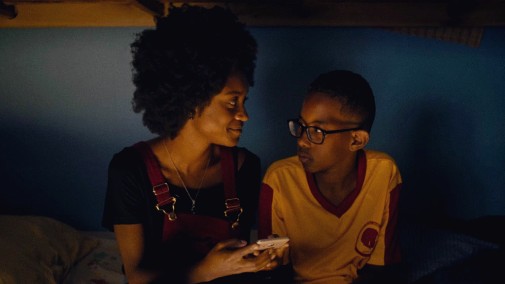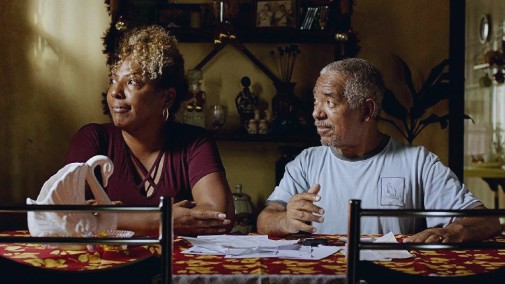
Looking over the city she calls home, Tércia lingers and, in turn, the camera lingers on her. It's a beautiful, if humble, image, her silhouette against a celestial painting. The twilight sun makes watercolors out of the skyline, yellow bleeding into blue, gray buildings falling into the cold penumbra. The contemplative frame can contain many meanings, and director Gabriel Martins doesn't force the audience's hand. We're free to surmise what we want from the picture. Speaking from a personal place, I couldn't help but feel a melancholic kinship. Maybe it's projection, but I recognized myself in Tércia, looking at a seemingly peaceful world I thought I knew until it proved me wrong...
It's how many felt during the last few years, as Far Right rhetoric jumped out of the history books and took major seats of government all over the world. As the film opens with fireworks commemorating his 2018 electoral victory, President Jair Bolsonaro casts a shadow over Mars One. Still, Gabriel Martins finds light amid the darkness, portraying Tércia and her family's quotidian existence, their tribulations, their dreams of escape.
The Martins are a Black Brazilian working-class clan, a quartet of dreamers, each striving for a better life in the face of adversity. They're a tight-knit group, yet there are deep cracks in the foundation of their unity. As Mars One's observational two hours unfold, we're invited to consider each member as an individual and part of something bigger, as persons and family. The patriarch, Wellington, is a recovering alcoholic who works at a fancy high-rise. The stark contrast between classes is part of his daily routine, caring for the beautiful flowers of those who have everything but still feel they're owed more. He's optimistic to a fault and loves soccer a bit too much. So much so that he's put all his hopes on the possibility of his son, Deivinho, becoming a successful player.
In those expectations lies an intersection of altruistic hopes and selfish myopia. No matter how much Wellington may wax rhapsodic about the golden life of a soccer star, Deivinho doesn't seem especially interested in the prospect. He plays ball as a concession to fatherly pressures but would rather spend his days listening to Neil deGrasse Tyson lectures and building homemade telescopes. Other films might have painted the conflict as a black-and-white dichotomy between a heroic youth and his perfidious father. Mars One, however, prefers to extend empathy to both parties, acknowledging the sin of not listening and the struggle to make oneself heard. There are no monsters in sight, not in the family home, at least. On the TV screen, though, it's another matter.

Deivinho's closest ally is his older sister, Eunice nicknamed Nina, who patiently listens to his daydreams about astronomy and taking part in the first Martian colonizing expedition. So close is their bond that the threat of separation rankles, even when its motivations are benign. She's found a girlfriend she loves, despite the unspoken tensions born out of their disparate economic backgrounds. Nina's stubborn and obstinate, too, though one can feel trepidation lacing her resolute attitude. For instance, there's reluctance in opening up about her sexuality to the family and a similar panic about allowing her upper-class girlfriend to perceive the humility of her upbringing. Is it shame, fear? Maybe both. One thing's for sure. She wants to move out of the Martins house and start a new chapter alongside her beloved. It hurts but growing up always hurts.
In some ways, Tércia is both the most obviously stressed and content family member. Her worry comes out of compassion, the terror she's bringing pain into her loved ones' lives. A profoundly superstitious woman, she's the victim of a cruel prank, whereupon a raving lunatic threatens to detonate a bomb at a local café. While it was all a charade for TV, the Martins matriarch is shaken to her core, starting to see misfortune wherever she goes. Neither direction nor script makes efforts to over-articulate the political anxieties intrinsic to Tércia's anguish, but they're there plain to see. Notice the financial insecurity that underlines many of her worries, how her belief in the bomb ruse and the prankster's misogynistic right-wing rant speaks multitudes about what she, as a Brazilian, has grown to see as commonplace.
What's tragic about Tércia's inner conflict is how little her family seems to notice. Even as she recalls the shock of the bomb's blast, neither her children nor husband pays mind to her obvious trauma. As ever, Gabriel Martins doesn't portray these behaviors as malicious. On the contrary, his is a humanistic cinema, generous, more interested in his characters' survival, their tireless pursuit of happiness, than the causes of their grief. Some might see this approach as toothless, verging on saccharine, but the outside pressures, social mores, and political woes are always there, the shadow over the city and community. Furthermore, by focusing his camera on a disenfranchised Black family that includes a queer young woman and a boy who rejects the "desporto rei," Martins is subtly radical.

He criticizes the forces of oppression by bullishly refusing to make them the center of his movie. Instead, he showcases the human antithesis of their inhuman values. As a cineaste, Gabriel Martins also finds beauty in what many may declare ugly or taboo. Look in wonder at how a sex scene between two women is shot with frank sensuality, blue braids over black skin, faces lost in the raptures of ecstasy. Appreciate the humor in Rejane Faria's miraculous performance as Tércia, each reaction shot an unexpected oscillation between tragedy and farce. In truth, the entire cast is exceptional, from the kids to the adults, with some more specific applause to Carlos Francisco's work as Wellington. As the world falls apart around the soccer lover, the actor breaks our heart and infuriates with the same gesture. In the end, though, all that actorly chaos subsides in quiet contemplation. Twilight has given in to night, darkness engulfs, but hope remains, a shining light that refuses to be snuffed out.
Mars One is part of the World Cinema Competition program at Sundance